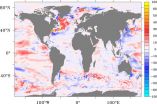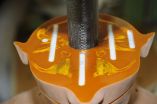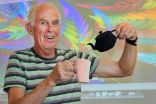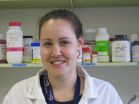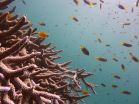Deconstructing Ebola to find its weakness and defeat it
2014-12-03
(Press-News.org) The Ebola epidemic in West Africa has pushed the decades-long search for a treatment to a frenetic pace. Somewhere in the virus' deceptively simple structure is a key to taming it. To find that key, scientists are undertaking multiple strategies, some of which are being fast-tracked for human testing, according to an article in Chemical & Engineering News (C&EN), the weekly newsmagazine of the American Chemical Society.
Senior editors Lisa M. Jarvis and Bethany Halford of C&EN note that the Ebola virus is endowed with a mere seven genes that code for eight proteins. Although few in number, the proteins each have many functions, which allow the virus to commandeer nearly 70 proteins from a person it infects. To fight this highly efficient virus, scientists are taking several approaches. They're designing antibodies to prevent the virus from attaching to host cells, and working on small molecules to attack the virus at various stages of its life cycle. They're also starting clinical trials on antiviral drugs that are already approved to treat other kinds of infections.
If developed quickly enough, an effective treatment could curb the current outbreak. It could also potentially spare the world from future epidemics. But as some scientists point out, drugs and vaccines take years to tailor into safe and effective therapies, so it's essential the efforts continue long after this crisis passes.
INFORMATION:
The American Chemical Society is a nonprofit organization chartered by the U.S. Congress. With more than 161,000 members, ACS is the world's largest scientific society and a global leader in providing access to chemistry-related research through its multiple databases, peer-reviewed journals and scientific conferences. Its main offices are in Washington, D.C., and Columbus, Ohio.
To automatically receive news releases from the American Chemical Society, contact newsroom@acs.org.
Follow us: Twitter Facebook
ELSE PRESS RELEASES FROM THIS DATE:
2014-12-03
New research shows that ocean heat uptake across three oceans is the likely cause of the 'warming hiatus' - the current decade-long slowdown in global surface warming.
Using data from a range of state-of-the-art ocean and atmosphere models, the research shows that the increased oceanic heat drawdown in the equatorial Pacific, North Atlantic and Southern Ocean basins has played a significant role in the hiatus.
The new analysis has been published in Geophysical Research Letters by Professor Sybren Drijfhout from the University of Southampton and collaborators from ...
2014-12-03
This news release is available in German.
The new study establishes that the best combination for incentives and punishment that promotes cooperation are in the form of "First carrot, then stick". The mathematical proof shows how the combined sequential use of reward ("carrot") and punishment ("stick") promotes cooperation in collaborative endeavors, such as protecting social commons and maintaining mutual aid.
Rewards and punishments are the most tried and true approaches when trying to promote cooperation in collaborative endeavors. New research, in terms of ...
2014-12-03
Analysis of data from the MATROSHKA experiment, the first comprehensive measurements of long-term exposure of astronauts to cosmic radiation, has now been completed. This experiment, carried out on board and outside of the International Space Station, showed that the cosmos may be less hostile to space travellers than expected.
Among the many life-threatening hazards to the space traveller, cosmic radiation is a major one, considerably limiting the time astronauts may spend in space without incurring excessive risk to their health from too high a dose of this ionizing ...
2014-12-03
An Australian National University (ANU) mathematician has developed a new way to uncover simple patterns that might underlie apparently complex systems, such as clouds, cracks in materials or the movement of the stockmarket.
The method, named fractal Fourier analysis, is based on new branch of mathematics called fractal geometry.
The method could help scientists better understand the complicated signals that the body gives out, such as nerve impulses or brain waves.
"It opens up a whole new way of analysing signals," said Professor Michael Barnsley, who presented ...
2014-12-03
INDIANAPOLIS, December 2, 2014 -- Today, Eli Lilly and Company announced results from new analyses of two Phase 3 trials evaluating the relationship between cognitive and functional treatment effects in patients with mild Alzheimer's disease. Based on post-hoc analyses of the Phase 3 trials, the findings suggested that cognitive deficits were more apparent than functional deficits in mild Alzheimer's disease when measured with the Alzheimer's disease Assessment Scale-Cognitive (ADAS-Cog) and the Alzheimer's disease Cooperative Study-Activities of Daily Living (ADCS-ADL) ...
2014-12-03
Amsterdam, The Netherlands, December 2, 2014 - Detection, prevention, and preclinical treatment are three key areas that may make a difference in the battle to reduce the rapid rise of new Alzheimer's disease (AD) cases every year. These three topics are the focus of an important new supplement to the Journal of Alzheimer's Disease.
Organized by Guest Editor Jack de la Torre, MD, PhD, Professor of Neuropsychology at The University of Texas at Austin, the supplement is a novel guide to how Alzheimer dementia may be approached and managed right now, not years from now. ...
2014-12-03
Scientists have released details of a raft of new chemicals with potent anti-malarial properties which could open the way to new drugs to fight the disease.
A new paper in PNAS is the third published by the group at the Australian National University (ANU), which has collaborated with groups from around the globe to uncover potential ammunition in the fight against malaria.
Over 200 million people contract malaria each year, and the parasite that causes the disease has become resistant to most of the drugs currently available.
"The papers show the malaria parasite ...
2014-12-03
A glimmer of hope for corals as baby reef builders cope with acidifying oceans
While the threat of coral bleaching as a result of climate change poses a serious risk to the future of coral reefs worldwide, new research has found that some baby corals may be able to cope with the negative effects of ocean acidification.
Ocean acidification, which is a direct consequence of increased atmospheric carbon dioxide levels, is expected to have a deleterious effect on many marine species over the next century.
An international team examining the impact of ocean acidification ...
2014-12-03
Coral reefs provide a range of benefits, such as food, opportunities for income and education, but not everyone has the same access to them, according to a new study conducted by the ARC Centre of Excellence for Coral Reef Studies (Coral CoE) at James Cook University.
The researchers examined how people from 28 fishing communities in Madagascar, Kenya, Tanzania and Seychelles benefit from the marine environment.
For many years conservation in developing countries has been based on the assumption that improvements in ecosystem conditions, such as increasing coral reef ...
2014-12-03
December 3, 2014 -- Individuals conceived in the severe Dutch Famine, also called the Hunger Winter, may have adjusted to this horrendous period of World War II by making adaptations to how active their DNA is. Genes involved in growth and development were differentially regulated, according to researchers at the Leiden University Medical Center, Harvard University, and Columbia University's Mailman School of Public Health. Findings are published in the journal Nature Communications.
During the winter of 1944-1945 the Western part of The Netherlands was struck by a severe ...
LAST 30 PRESS RELEASES:
[Press-News.org] Deconstructing Ebola to find its weakness and defeat it
